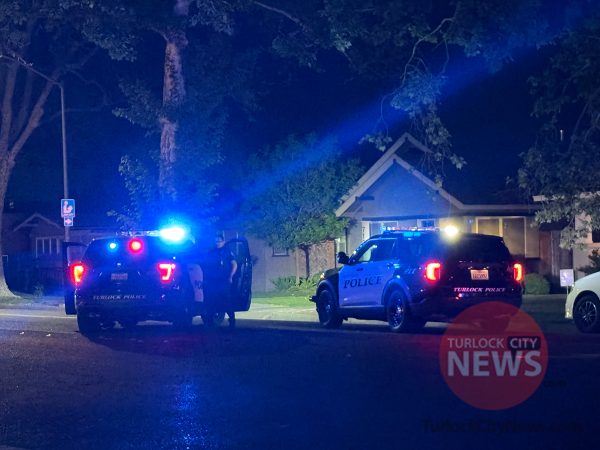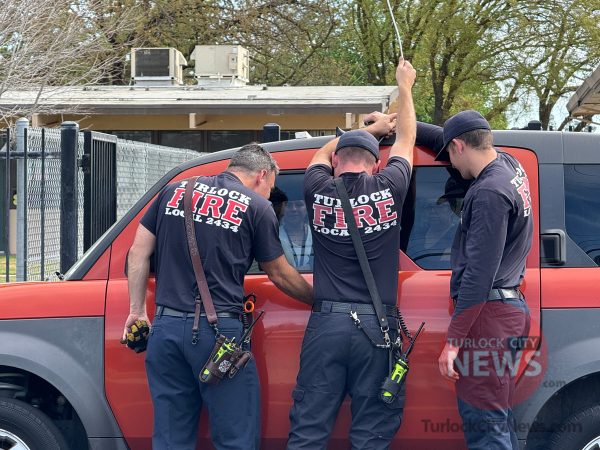All Turlockers who spoke at a Thursday meeting on critical issues, held at Pitman High School, would support a road tax – albeit hesitantly – if revenues were devoted solely to repairing roads.
“Although I'm not excited about it, I would support a sales tax increase,” said Ed Freidberg, a 25 year Turlock resident.
The meeting was the last of four meetings scheduled to discuss critical issues facing Turlock. Most discussion focused on the need to improve Turlock's roads and the feasibility of passing a new tax for that purpose.
The message is nothing new to City Manager Roy Wasden. Turlockers in general believe they are overtaxed, he said, but they desire better roads.
“We all feel like we pay enough in taxes,” Wasden said. “I don't disagree. We pay a substantial amount in taxes and fees.”
Yet the city lacks funding to repair local roadways.
Turlock currently spends no money on road maintenance from its General Fund – the pot of $13 million tax dollars which the city can spend as it wishes. According to Wasden, there's simply no way to spend more money with the Turlock's coffers already dry.
“The General Fund is operating in the negative right now to deliver the current level of service,” Wasden said, noting the Turlock City Council approved a budget $1.4 million in the red on Tuesday. “… Without spending a greater deficit, there's just no money available in the General Fund.”
In large part, the lack of funding comes due to a systemic inequity in how tax dollars are distributed to Turlock. Of the $215 million in property, sales, and state income taxes collected in Turlock last year, the city saw only $13 million enter its coffers. Due to a quirk of Prop 13, the law which governs property tax, Turlock received just 6 cents for every dollar collected locally; the City and County of San Francisco receives 60 cents of every dollar collected there.
Debbie Bailey, a former public administrator who has lived in Turlock for over 26 years, agrees: state and federal agencies are choking Turlock dry. To fix the roads, a tax is needed.
“To me, there's no question that more revenue is needed,” Bailey said. “It's not anything that anyone has done wrong at the local level, it's just the way things are right now – unless we want to wait years and years to get our roads fixed.”
But Bailey expressed concern that tax revenues could be inappropriately spent on non-roadway improvements. She pointed to the Turlock-funded installation of an artificial turf track and field at Turlock High School's Joe Debeley Stadium; that work was funded with redevelopment dollars, which are intended to reduce blight.
“I think that's a healthy skepticism,” Turlock City Councilman Steven Nascimento said. “Our council could commit to using those funds for a different reason than another council in two years.”
Turlock has essentially two options when it comes to a tax. A general tax would require the approval of 50 percent of voters, but would not be legally dedicated to roadways. Revenues from dedicated tax could only be spent on roads, but would require the approval of two-thirds of Turlock voters – potentially a tough threshold to reach.
“I wish a two-thirds dedicated tax would pass,” said Turlocker Roger Falls, who formerly headed Turlock's bus system. “I have serious doubts that would actually occur.”
Because of that improbability, Falls questioned the wisdom of spending tax dollars on a campaign for the measure.
Falls suggested an alternate option – Turlock could ask voters to approve a general tax, then purchase a bond dedicated to road repairs with the revenues. The legalities of such a tactic remain uncertain, and Turlock would be forced to shoulder the finance charges for any bond, reducing funding available for streets.
Even should a proposed, one-half percent sales tax be passed, revenues would tally only about $5 million annually.
The work to resurface Canal Drive cost $2.2 million. The current resurfacing on Fulkerth Road will cost $1 million.
“That kinda gives you an idea of how expensive road repairs are,” City Engineer Mike Pitcock said.
A 2008 study found that Turlock would need to spend $10 million annually just to maintain roads at their current state – not to make improvements.
“We recognize that $5 million isn't $10 million,” Wasden said.
But that $5 million, added to the about $2 million the city spends on roads today, could be leveraged to obtain substantial state road grants. Those grants are currently unavailable to Turlock as it is not a “self-help” city – one that taxes itself for roads.
Many details remain to be hammered out. But a deadline to make the November ballot – the first week of August – is nearing rapidly.
The Turlock City Council is expected to discuss the proposed road tax further at an upcoming meeting, but the discussion has not yet been scheduled.







